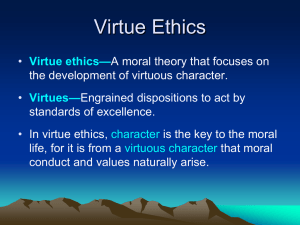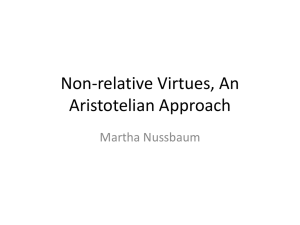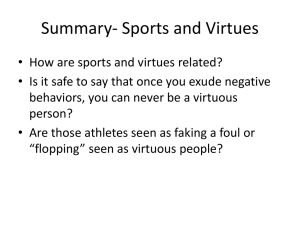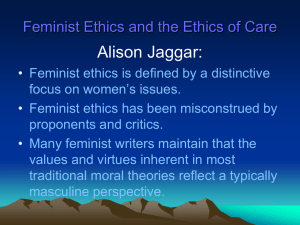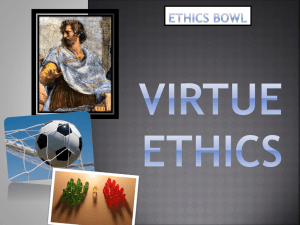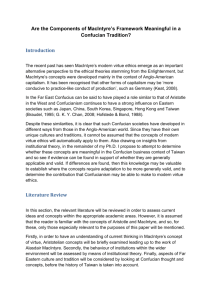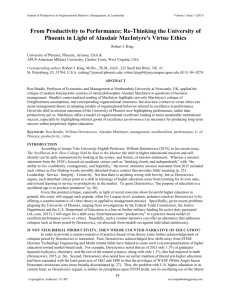MacIntyre and Anscombe: Two Modern Virtue Ethicists
advertisement
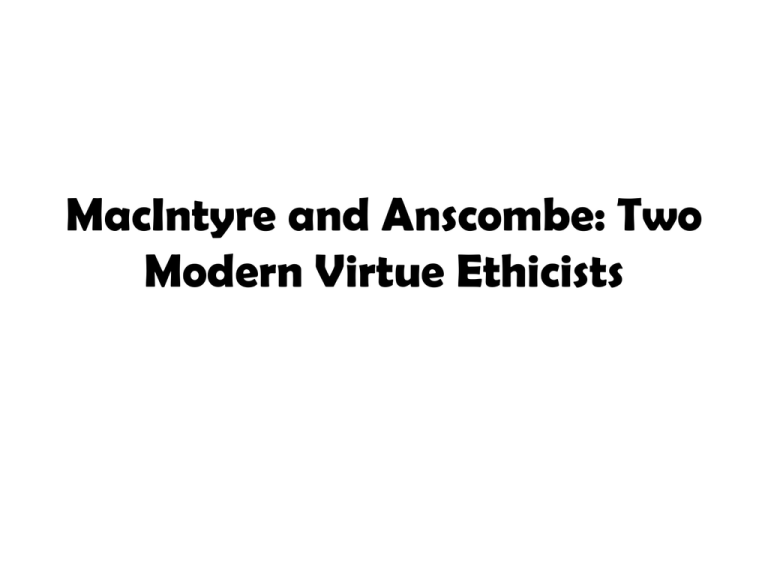
MacIntyre and Anscombe: Two Modern Virtue Ethicists Learning objective • To know and understand the modern development of virtue ethics by Alasdair Macintyre Key words Internal External Good will Key question What is a virtue? OVERview • Modern ethical study has lost its way. • It is too concerned with normative rules or the reality of those normative rules. (meta ethics) • This has not helped fill the moral vacuum of society. • Anscombe believed that Virtue ethics was the only solution to the moral vacuum in society. • Macintyre believed the same thing. • the best way to fill the moral vacuum is to chart our moral virtues. • Throughout history they have been important because they help ordinary people be moral. • Virtues must be based on good will. • There are internal and external goods. • The virtues help us overcome the effects of the three groups of people. The 20th century revival • Since the enlightenment ethics has been dominated by normative theories. • These theories give a moral answer to a problem based on different circumstances. • Virtue ethics before the 20th century had died out. • however it was noticed that there was a distinct gap in the moral mindset that normative ethics was not filling. • A fresh approach was needed. anscombe • Elizabeth Anscombe initiated the modern revival of virtue theory. • She was critical of moral theories which allowed any moral act of any kind if it brought about some good end. • She argued that consequentialist thinking has come to dominate much of modern philosophy. anscombe • “The concepts of obligation, and duty – moral ‘ought’, ought to be jettisoned.” • These are part of ethics which no longer has a basis as many are based around the idea of a creator God which we have got rid of. • She said the idea of ethics defined as some legalistic principles (rules) needs Ethics is too concerned with this act and that to be changed. act being immoral. anscombe • This was just as true for utilitarian ideas of the greatest good for the greatest number as it was for Kant’s deontological categorical imperative. • Anscombe proposed a different way of studying ethics. • We should think about the idea of a virtue and human flourishing, referring back to Plato and Aristotle. • Further development was necessary in understanding what we mean by virtue. History is important • In 1981, Alasdair Macintyre (right) wrote a book called ‘After Virtue’ in which he argued that we should give serious consideration to Aristotle’s theory. • In his book, he traced the history of virtue ethics and tried to establish a system of virtue ethics for the modern age. • His basic complaint was that modern ethics put too much emphasis on reason and not enough stress on people, their characters and the contexts of their lives. Homeric virtues • Macintyre noticed that as societies developed 2,500 years ago, so different virtues developed too. • In the age of Homer a poet who told the story of (the Iliad and the Odyssey), the following virtues were paramount; – Physical strength – Courage – Cunning – Friendship • These are known as the HOMERIC VIRTUES Athenian virtues • Eventually, As cities (the polis) developed, life slowly became more civilized. • Aristotle developed his theory of virtues for the city of Athens and his virtues became known as the Athenian Virtues. They were (briefly) as follows: – Courage – Friendship – Justice: retributive (getting what you deserve) and distributive (making sure that the goods of society are fairly distributed) – Temperance – Wisdom • The emphasis on strength and cunning, needed in time of war, was gone. • Macintyre argued that the Athenian virtues of Aristotle were the most complete. The problem • For Macintyre, the problems with ethics began during the Enlightenment, a period of time during the 17th and 18th Centuries when Science became more important for discovering truth. • It was thought that a single, rational cause for morality could be discovered and thinkers such as Hume and Kant attempted to do this. The virtues • Macintyre realised that whilst the theorists in universities were trying to work morality out, society still needed virtuous people in everyday life • people who run jumble sales to raise money for the local hospital for example. • Macintyre argued that despite the theories of people like Kant and Hume, the virtues have lived on. • What’s more, society depends for its very existence, upon people who exhibit the virtues. What was his theory then? • Macintyre argued that living a virtuous life depended upon 1. getting into the habit of being moral 2. and of striving towards being virtuous • He argued that this can give life an overall purpose and meaning. • The virtues for Macintyre, are any human quality which helps us to achieve the ‘goods’ in life. HABIT INTENTION Courage: courage is very important as it helps us to face up to challenges that may come our way. His virtues Wisdom: this is not knowledge: it is the ability to know how to act in the right way in particular situations. Justice: this is a very important virtue. Justice is fairness and it is the art of giving someone what they deserve or merit. To be unjust is to be unfair. Industriousness: hard work. Patience Hope: being optimistic. Temperance: this prevents us from acting rashly; losing our temper for example. GOOD WILL • Underneath the virtues must be the good will of the person. • To be virtuous, one must desire to do virtuous things, rather than do them involuntarily. • An act is not virtuous if it is not intended. Is this similar to Aristotle? Internal and external goods • Macintyre also used the idea of internal and external goods, a version of which is seen in Natural Law. • An internal good is specific to the activity itself; for example, giving money to charity results in helping others and developing a sense of satisfaction. • It is an necessary part of what it means to do this action. • example? Internal and external goods • An external good, is a good that is not specific to the act. • It is something good or moral that comes out of doing the activity or action. • It is called ‘external’ because it comes out of doing the activity • For example, when giving to charity, your example may inspire others to do the same. • Other examples? vice • Macintyre also warned that being virtuous does not prevent you from being open to vices. 1. He gives the example of a great violinist who could be vicious, 2. or a chess player who could be mean spirited. • The vices would prevent these people from achieving maximum virtue. THE MOST IMPORTANT VIRTUES • Macintyre suggests that the three most important virtues are: – justice – courage – honesty • We can only achieve moral excellence through practising these three. • They are core virtues that help to prevent organisations and institutions from becoming morally corrupt. • It is largely through institutions that traditions, cultures and morality spread: if these institutions are corrupt, then vices become widespread. Three people in society • Alisdair MacIntyre said that in today's society we find ourselves in a ‘moral vacuum’. • The arguments between consequentialist and deontologists has left society confused and devoid of virtue. • He believes ‘concepts of truth and rationality have become, as it were free floating’ • He believes that it is desires not morals that are driving our choices. • MacIntyre says that three archetypal characters now strut our moral stage. These are the bureaucratic manager, the rich aesthete, and the Therapist. Our society Three types of people: THE THERAPIST the Therapist is necessary to balance the failed aspirations and thwarted hopes that the BM and RA would inevitably cause!! The rise in the beauty business in Britain and the number of cosmetics, bath products, and 'spiritual' treatments, which claim to have therapeutic value. The society we have created teaches us to value others less and ourselves more. Therefore, we need Therapists to conceal the emptiness and meaninglessness of life from us. TV chat show and game show host are examples. THE RICH AESTHETE This man, woman or couple, live for the more exciting and exotic pleasures of life. We see their images, glamorous, thin (women) aging (men - but with the obligatory trophy wife 30 years younger), in expensive homes or in exotic holiday destinations, plastered and all over 'Hello' magazine Posh and Becks Macintyre is talking about the 'image as icon'. It's their image in the eye of society that embodies the Rich Aesthete. THE BUREAUCRATIC MANAGER the sort of person to be to get a job in business This person is efficient at using resources and people to achieve his/her own aims and objectives. People and resources are all dispensable to the Bureaucratic Manager. The effect • The bureaucratic manager is driven by profit, he has no regard for his employees and his colleagues and will forsake anyone to ensure hi the shareholders have sufficient profits. He may be a loving father but at work he be leaves his morals at home. • MacIntyre condemns this as he believes like Aristotle that a holistic attitude to life is essential in order to achieve ultimate happiness or ‘eudaimonia’. • The Rich Aesthete could be compared to the Beckham’s or J-Lo. They are driven by hedonistic pleasures. They are always looking for the next new product or fashion and this is all they are concerned with. • The Therapist is much like Graham Norton. He broadcasts regularly ensuring that the nation is anaesthetised to morality. Activities 1. Compile a list of virtues suitable for the 21st century. Use the table on p27 and the paragraphs above to help you. 2. Decide on the ‘vice of deficiency’ and ‘vice of excess’ for each of your virtues. 3. In one paragraph for each, describe what you think a complete virtuous life and a completely virtuous society would look like. Activities 1. Not long ago it was reported that a policeman had transformed his town, reducing antisocial behaviour by half. He set up a night school to teach children about medieval notions of respect and chivalry. More than a hundred children took the course which the policeman said instilled a sense of personal pride, of mannerly and compassionate behaviour and a respect for others. 2. Devise a course of a ‘virtue club’. What would the course do? Review • Modern ethical study has lost its way. • It is too concerned with normative rules or the reality of those normative rules. (metaethics) • This has not helped fill the moral vacuum of society. • Anscombe believed that Virtue ethics was the only solution to the moral vacuum in society. • Macintyre believed the same thing. • the best way to fill the moral vacuum is to chart our moral virtues. • Throughout history they have been important because they help ordinary people be moral. • Virtues must be based on good will. • There are internal and external goods. • The virtues help us overcome the effects of the three groups of people. Examples of Virtue Ethics • Bruderhof and Amish communities – Anti-worldly – Pacifist – Family – Story What makes one group virtuous and not another? • Inner-City Gangs – Common values – Models – “Virtuous” actions – Codes of honour • Ku Klux Klan? – Focused – Live tradition – Stories and Models – Common enemy – “The family is the strength of our nation.” • The Christian Church? • The Taliban? • The Scouting Movement? • Your school? • Your friends? Are the virtues the same for everyone? • People are very different. • But we face the same basic problems and have the same basic needs. • Everyone needs courage as danger can always arise. • Some people are less well off, so we will need generosity. • Everyone needs friends so we need loyalty.




